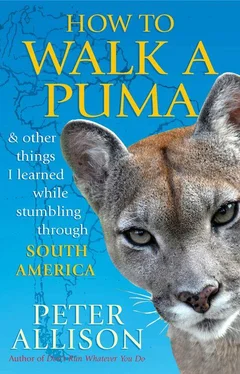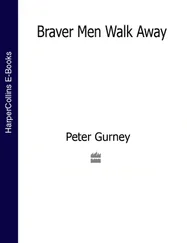We camped in dome tents by the river that night, and Otobo’s travelling companions introduced themselves to us, some in Spanish that Tom translated, others in their native language of Huao (which is pronounced as a quite lovely ‘Wow’). Everyone’s introductions were brief, except for one guy’s, who rambled on forever about which village he was born in, where he grew up, and innumerable other details. ‘I don’t like flies,’ he even said at one point. Tom just let him go on, afterwards explaining that he had a reputation for aggression.
Then we four newcomers were given Huaorani names, a process that the five or so of them all meditated and consulted over. Mine was Ayare, because I reminded them of someone of that name, who was tall. (Most Huaorani are barely above five foot, so I am tall in their part of the world.) He was also known as a flirt, I was told, good with the ladies, and I’m sure that with my black eye I must have seemed a real catch.
An owl called throughout the night, a mournful and sleep-defying cry. The next day Otobo described it to us as: ‘A really big one. Bigger than an eagle. Bigger than a man even.’ Later we found the owl in question. It was maybe a foot or so in size, but of course from the ground it did look huge. So therefore to the Huaorani it was.
Setting off in the canoe I soon learnt why the Huaorani traditionally don’t wear clothes. It rains here furiously, at least once a day—and I was there in the dry season. In the wet season it rains twice a day. Clothes get soaked and there’s no time to dry them before the next drenching, creating a perfect environment for fungi and parasites. It is only in the open spaces directly over the river that any light can penetrate, so after our day’s drenching Otobo steered the boat down the middle of the river, swerving only for stumps and the occasional river dolphin. We camped another night, and spent another full day puttering downriver before finally reaching Otobo’s village, a threebuilding affair named Boanamo which is home to Otobo, his wife and their three children, plus any one of his three brothers who might pass through. Only a few hundred metres away was another high-arched thatched building, which housed Otobo’s parents, their pet macaw, several dogs and a spider monkey who hissed his bitey intent at any approach. I was introduced to Otobo’s father, Omagewe, a diminutive but muscular man in his sixties. He spoke no Spanish, only Huao, so smiled and laughed in greeting.
The English tourists whose trip I had piggybacked in on were keen bird watchers, and that suited me pefectly. I knew from my time in Africa that bird watchers usually spot more animals than anyone else as they are attuned to picking up the smallest movements, the slightest differences in colour, and know how to sit patiently and quietly to see what appears. So it was that we spent our first full day off the canoe at a salt lick, watching rainbow-coloured streams of parrots flutter down to eat the nutrient-rich clay that counters various toxins in their food.
‘So, you going to get naked?’ Tom asked me. One of the guides at Sacha who had had some dealings with the Huaorani had told me that they would never trust anyone in clothes; only if you’re naked can they be sure you’re not hiding anything.
‘Sure,’ I replied. ‘But they’re all in their seventies,’ I indicated the English, ‘so I don’t imagine they want to see me nude, nor me them.’
‘The reason I asked is that Omagewe,’ Tom indicated Otobo’s father, ‘was laughing earlier and saying you should take your pants off.’
‘Really? I had no idea we’d become so close already.’
Tom just laughed, and I sat watching the birds and my fellow travellers: Quiet Chris, a softly spoken, well-travelled and pleasant man, who was a friend of the other two, a married couple—Mute Elizabeth, whom I never formed an opinion of because she never spoke, and her husband Stinky Fred, who had plenty of personality, unfortunately not all good. He belonged to a generation who believe it’s okay to be racist and misogynistic as long as you wink at the end of each statement to show it’s all good fun. And he smelled. We’d been asked not to use the insect repellent DEET, or even deodorant, as it would frighten off animals, but he took this to rule out bathing altogether. It was hard not to retch when downwind of him, but on the plus side he did attract lots of intriguing insects.
For my part I was bathing, in the chocolate milk–coloured waters of the Cononaco River, but cautiously. There were candirus here, and caiman, stingrays and hidden stumps. I also had a sizable gash on the back of my head, due to one of my assailants breaking a beer bottle over it during the mugging. Occasional slivers of glass still emerged from the swollen wound that I was treating with nothing but pawpaw ointment. I was vaguely concerned that this might attract piranhas, but not so much that I would take Stinky Fred’s route and not bathe at all.
•
December twenty-fifth 2010 was a day of good and bad news. Christmas was never a big deal in my household so means little to me, and even less to the Huaorani, although they did make an effort to honour the strange ritual of the cowode by prepping a smoked chicken for us. With no refrigeration it would be the last store-bought meat of our stay, and any other protein would come straight from the jungle.
The day itself involved more birdwatching, some pleasant poking around in the jungle, and a bit of a paddle on the river in a borrowed canoe, Omagewe laughing from the bank at my steering issues (mine was the only canoe tacking like a yacht; for some reason I could not make the bloody thing go straight). Later, Omagewe told us he had found a nest nearby belonging to a harpy eagle, one of the world’s most powerful birds and something I was very eager to see. As I was somewhat more nimble than the English I agreed to go ahead and check out the hunting trails leading to the nest. The good news was that it wasn’t too strenuous a walk, but the bad news was that it wasn’t a harpy eagle, rather an ornate hawk eagle—still impressive and beautiful, but like seeing an ocelot when looking for a jaguar.
That night, though, disaster struck as I made my way into my small tent. A searing pain hit my hand as I undid the zip, and I turned ashen-faced to Otobo’s brother Bartolo who was standing nearby.
‘Mariela! Tom!’ Bartolo shouted. ‘Peter’s been bitten by a snake!’
The good news was that he was wrong. It was a Konga ant. The bad news was that these are the size of a bullet and pack as much ill intent. Some people bitten by it have fevers that last for days. I took some painkillers, writhed a while, and eventually fell asleep.
No fever eventuated, and the next day was my birthday. This concept is also alien to Huaorani, who have no real idea when they were born; to them it simply does not matter. Any day can be special in the jungle, whether it brings food, a new baby, or a pleasant reunion with family.
That day I saw several new species of bird, and was treated by Mariela and the kind but bemused Huaorani to a birthday cake made from two pancakes on top of each other held together and slathered on top with Nutella. The real treat though was meeting Otobo’s father-in-law, a smiling older fellow, around five foot one, with an impressive mullet. Together with Omagewe, he chanted a history to us. It basically listed all the people the men had killed—Otobo’s father-in-law had managed five in a ‘war’ with petroleros (oil workers) back in the seventies.
Later that evening I saw a spectacular hummingbird, large for the family at the size of a starling, with tail streamers that curved and crossed each other, covered in iridescent red plumage. Called the fiery topaz, this bird was very high on my wish list, and seeing it made up for some earlier disappointment when Bartolo spotted a tapir ahead of a canoe we were in, but I just missed it, seeing only the bushes rustling as it scampered away. Still, the sighting filled me with a certain optimism. Everything felt like it was getting closer. A jaguar must be nearby. The Huaorani were right—any day could be a special one in the jungle.
Читать дальше












